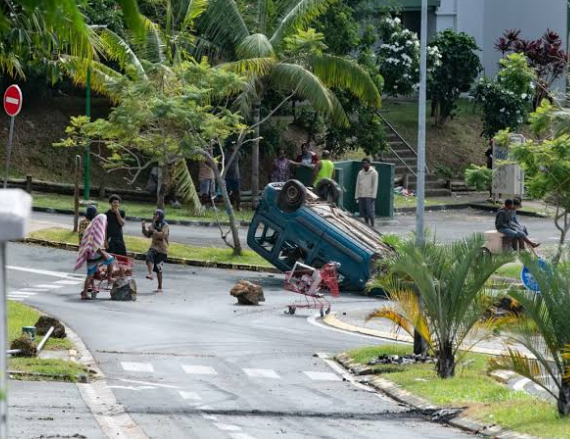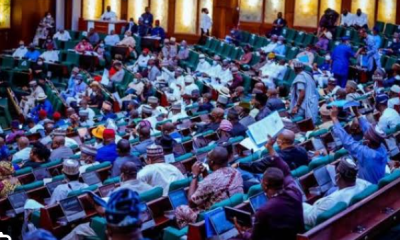News
France Bans TikTok In Riot-Hit New Caledonia

By Kayode Sanni-Arewa
France deployed troops to New Caledonia’s ports and international airport, banned TikTok and imposed a state of emergency Thursday after three nights of clashes that have left four dead and hundreds wounded.
The emergency measures give authorities greater powers to tackle the unrest that has gripped New Caledonia since Monday, when protests over voting changes pushed by Paris turned violent.
Additional powers under the state of emergency include the possibility of house detention for people deemed a threat to public order and the ability to conduct searches, seize weapons and restrict movements, with possible jail time for violators.
The last time France imposed such measures on one of its overseas territories was in 1985, also in New Caledonia, the interior ministry said.
“No violence will be tolerated,” said Prime Minister Gabriel Attal, adding that the state of emergency “will allow us to roll out massive means to restore order”.
Attal told a crisis ministerial meeting that troops had been deployed to secure ports and the international airport and the government representative in New Caledonia has “banned TikTok”.
The airport is already closed to international flights.
The state of emergency was announced hours after a French gendarme who was seriously injured during riots in New Caledonia died of his wounds, said Interior Minister Gérald Darmanin, raising the death toll to four.
The death of the French gendarme followed two nights of rioting as protesters demonstrated against a constitutional reform being debated in the national assembly in Paris that aims to expand the electorate in the territory’s provincial elections.
Vehicles torched, shops looted
The unrest flared after French lawmakers approved a bill extending voting rights in provincial elections to residents arriving from mainland France – a change critics fear could marginalise Indigenous people and benefit pro-France politicians.
Following lengthy and at times tense debates, the National Assembly in Paris adopted the reform shortly after midnight, by 351 votes to 153.
Macron cancelled a planned visit to Normandy to chair cabinet-level national security talks on the crisis Wednesday morning, his office said.
Protests turned violent Monday night, with shots fired at security forces, vehicles torched and shops looted in the worst unrest the French overseas territory has seen since the 1980s.
In response, authorities deployed a heavy security contingent, imposed a curfew, banned public gatherings and closed the main airport.
French authorities in the territory said that more than 130 people have been arrested and more than 300 have been injured since Monday in the violence.
“More than 130 arrests have been made and several dozen rioters have been taken into custody and will be brought before the courts,” the French High Commission of the Republic in New Caledonia said in a statement early Wednesday morning.
Describing the “serious public disturbances” as ongoing, the High Commission decried widespread looting and torching of businesses and public property, including schools.
It added that classes will remain scrapped until further notice and the main airport shut to commercial flights.
Dispute over voting rights
Macron has been seeking to reassert his country’s importance in the Pacific region, where China and the United States are vying for influence but France has a strategic footprint through its overseas territories, which include New Caledonia and French Polynesia.
Lying between Australia and Fiji, New Caledonia is one of several French territories spanning the globe from the Caribbean and Indian Ocean to the Pacific that remain part of France in the post-colonial era.
In the Noumea Accord of 1998, France vowed to gradually give more political power to the Pacific island territory of nearly 300,000 people.
Under the agreement, New Caledonia has held three referendums over its ties with France, all rejecting independence. But independence retains support, particularly among the Indigenous Kanak people.
The Noumea Accord has also meant that New Caledonia’s voter lists have not been updated since 1998 – meaning that island residents who arrived from mainland France or elsewhere in the past 25 years do not have the right to take part in provincial polls.
The French government has branded the exclusion of one out of five people from voting as “absurd” while separatists fear that expanding voter lists would benefit pro-France politicians and reduce the weight of the Kanaks.
‘Determination of our young’
Simmering protests over the planned changes to voter eligibility took a violent turn on Monday night, with groups of young masked or hooded demonstrators taking over several roundabouts and confronting police, who responded with non-lethal rounds.
One business group said around 30 shops, factories and other sites in and around the capital Noumea had been set ablaze, while an AFP journalist saw burned-out cars and the smoking remains of tyres and wooden pallets littering the streets.
Firefighters said they had received around 1,500 calls overnight and responded to 200 blazes.
Even after the curfew was put in place on Tuesday, there were acts of vandalism overnight, with the store of a major sports brand ransacked.
A prison rebellion involving some 50 detainees in the Camop-Est facility subsided after security forces regained control, local officials said.
Pro-independence party leader Daniel Goa asked the youths to “go home”, and condemned the looting.
But he added: “The unrest of the last 24 hours reveals the determination of our young people to no longer let France take control of them.”
The main figure of the non-independence camp, former minister Sonia Backes, denounced what she described as the anti-White racism of demonstrators who burned down the house of her father, a man in his 70s who was exfiltrated by the security forces.
“If he was not attacked because he was my father, he was at least attacked because he was White,” she told BFMTV.


News
Senate mulls terrorism charges for oil theft offenders

The Senate, yesterday, issued a stern warning that perpetrators of oil theft in the Niger Delta region may soon face terrorism charges and other stiffer penalties.
Senate President, Godswill Akpabio, disclosed this while declaring open a two-day public hearing on the “Incessant and nefarious acts of crude oil thefts in the Niger Delta and the actors held.”
The hearing organised by the Senate Ad-hoc Committee on Incessant Crude Oil Theft chaired by Ned Nwoko is aimed at addressing the persistent theft of crude oil in the Niger Delta and produce actionable solutions to the problem.
Akpabio, who was represented by his deputy, Barau Jibrin, said the 10th National Assembly would not stand idly by as the country loses billions of dollars annually to what he described as “brazen economic sabotage.”
He disclosed that the National Assembly was considering a range of strong legislative responses, including categorising major acts of oil theft as terrorism, mandatory digital metering for all oil production and exports, real-time monitoring, improved transparency in crude lifting and revenue reporting, as well as enhanced coordination among military, law enforcement, and anti-corruption agencies.
“Crude oil theft is not a victimless crime. It is directly responsible for economic instability, a weakened naira, underfunded critical sectors, and widespread poverty in oil-producing communities. It also finances illegal arms, fuels violence, and strengthens criminal networks.”
Akpabio lamented that despite past efforts, crude oil theft continues unabated due to systemic failures and gaps in enforcement and oversight. Recent reports estimate that Nigeria loses between 150,000 and 400,000 barrels of crude oil daily, costing the country billions in lost revenue.
“This public hearing must address critical questions: Who are the perpetrators? Are they militants, corrupt officials, international collaborators—or all three? Why have current security measures failed? And how are stolen shipments leaving the country undetected?” he asked.
The Senate President called on all stakeholders including regulatory agencies, oil companies, security forces and host communities, to work collaboratively to stop the looting of the country’s most valuable resource. He emphasised that oil companies must invest in surveillance technology and secure infrastructure, while host communities should act as first-line defenders rather than victims or accomplices.
“To the criminals stealing our crude oil, your time is up. To the agencies tasked with protecting our resources, the nation is watching. And to this Ad-hoc Committee, the Senate expects a robust, no-holds-barred report that will guide firm legislative and executive action.”
Akpabio commended Nwoko, who chairs the Committee convening the hearing and stressed that the recommendations must lead to actionable, measurable and time-bound solutions.”
“The survival of Nigeria’s economy depends on how we respond to this crisis,” he concluded.
Meanwhile, ahead of its planned two-day national security summit, the Senate, yesterday, set up a 20-member committee to organise the event.
The Senate President, Akpabio, who announced the committee’s formation during plenary, said it would be chaired by the Senate Leader, Opeyemi Bamidele, with Yahaya Abdullahi serving as the vice chairman.
Other members are Ireti Kingibe (FCT), Adebule Idiat (Lagos), Barinada Mpigi (Rivers), Babangida Hussaini (Jigawa), Jimoh Ibrahim (Ondo), Osita Ngwu (Enugu), Tahir Monguno (Borno), Titus Zam (Benue), Ahmed Lawan (Yobe), Abdulaziz Yar’Adua (Katsina), Gbenga Daniel (Ogun), Austin Akobundu (Abia), Shehu Buba (Bauchi), Ahmed Madori (Jigawa), Emmanuel Udende (Benue), Adams Oshiomhole (Edo), Shuaib Salisu (Ogun), Isah Jibrin (Kogi) and the Clerk of the Senate, Andrew Nwoba.
The committee is tasked with developing the summit’s framework, including setting the agenda, identifying core issues for discussion, and recommending actionable strategies to improve national security. Akpabio directed the committee to submit its report within two weeks.
The decision to convene the summit followed a resolution passed on May 6 after a motion sponsored by Jimoh Ibrahim to address escalating security challenges in the country was adopted. It is expected to address pressing issues such as terrorism, insurgency, and the alarming trend of leaking military intelligence to militant groups, an issue widely seen as compromising ongoing security operations.
This is not the first time the National Assembly would attempt to address security concerns through a summit. In May 2021, the ninth Assembly, under the then Senate President, Ahmad Lawan and House Speaker, Femi Gbajabiamila, organised a similar summit. Despite contributions from security experts, civil societies, and government agencies, insecurity has continued to plague the country.
News
Court convicts 10 Thai sailors, vessel for cocaine trafficking

Justice Daniel Osiagor of the Federal High Court in Lagos on Thursday convicted ten Thai nationals for trafficking 32.9 kilograms of cocaine into Nigeria.
The convicted individuals, all sailors, were found guilty alongside their vessel, MV Chayanee Naree, which was used to smuggle the illicit drug into the country.
The convicted Thais’ sailors are: Krilerk Tanakhan; Boonlert Hansoongnern; Jakkarin Booncharoen; Thammarong Put-tlek; Worrapat Paopinta; Marut Kantaprom; Werapat Somboonying; Urkit Amsri; Panudet Jaisuk, and Amrat Thawom.
The vessel and convicted sailors were first arraigned before the court alongside nine Nigerians, on the alleged offences in February 2022, by the National Drug Law Enforcement Agency (NDLEA).
The Nigerians are: Samuel Messiah; Ishaya Maisamari; Ilesanmi Ayo Abbey; Osabeye Stephen; Gbenga Ogunfadeke; Kayode Buletiri; Rilwan Omotosho Liasu; Saidi Sule Alani, and Jamiu Adewale Yusuf.
The vessel, the convicted sailors and the nine Nigerians were arrested on October 13, 2021, at Apapa, Lagos, on their arrival from Brazil.
They were charged before the court on charges bordering on conspiracy, unlawful transportation and unlawful importation of 32.9 kilograms of Cocaine.
Their illegal acts, according to the NDLEA, contravened sections 11 (b), 11(a) and 14 (b) of the National Drug Law Enforcement Agency Act Cap N30 Laws of the Federation of Nigeria, 2004. And punishable under the same Act.
The convicted Thais and their Nigerian alleged co-conspirators were accused of committing the acts alongside the trio of Kehinde Enoch, Ayo Joseph and one Tunde, all said to be at large.
The convicted sailors were prosecuted by the NDLEA prosecutors, who include; Mrs Theresa Asuquo, A. Adebayo and Paul Awogbuyi. While they were defended by their team of lawyers, who include Babajide Koku, Femi atoyebi and Tunde Adejuyigbe, who are Senior Advocates of Nigeria (SAN).
Upon conclusion of the NDLEA’s case, the convicted sailors opted for No-Case-Submission instead of opening their defence against the allegations against them. This was, however, contended by the prosecutors, who submitted that they had established a prima facie case against the vessel and its Crew.
In deciding the No-Case-Submission, Justice Osiagor acceded to the submissions of the prosecution and held that the prosecution had established a prima facie case against the vessel and its Crew members.
The judge therefore ordered the convicted Thais and others to open their defence against the charges against them.
Based on the court’s ruling, the convicted sailors entered a plea bargain agreement with the NDLEA.
At the resumed hearing of the matter for judgment today, and based on the plea bargain agreement, Justice Osiagor ordered the vessel to pay a fine of $4 million USD or Naira equivalent.
On the convicted sailors, the judge ordered the three Captains of the vessel, namely; Krilerk Tanakhan; Boonlert Hansoongnern; Jakkarin Booncharoen; to pay the sum of $50, 000, 00 USD. And that the other crew member to pay $30, 000, USD each. And that other convicted sailors are ordered to pay the sum of N100,000. 00, as a fine optio n.
Meanwhile, the trial of the nine Nigerians has been adjourned to June 25.
News
Court of Appeal affirms nullification of Ebonyi council polls

The Court of Appeal Enugu Division has affirmed the judgement of Justice R O Riman of the Federal High Court Abakaliki, nullifying the conduct of Local Government election in Ebonyi State.
Justice Joseph Ekanem, who read the lead judgement of the Appeal court, gave the ruling while dismissing the three appeals filed by Ebonyi State Government, Central Bank and Local Government Chairmen, challenging the ruling of the Federal High Court.
The Appeal Court ruled that the earlier judgement of Justice R O Riman then of Federal High Court Abakaliki remains valid and subsisting.
According to the Appeal court: “The judgment in FHC/AI/CS/224/2022, which the Appellants challenged on appeal, was meant to enforce compliance with the earlier judgment in FHC/AI/CS/151/2022 contrary to the argument of the appellants.”
The court ruled that the appeals were dismissed for proliferation of issues for determination by the appellants which resulted in an incompetent brief of argument.
-

 News14 hours ago
News14 hours agoAlleged cyber bullying: IGP re-arraigns VDM
-

 Opinion20 hours ago
Opinion20 hours agoHuman Capital Devt: The Rep Paul Nnamchi
-

 News16 hours ago
News16 hours agoBREAKING: PDP, NNPP Rep members abandon parties, lace boots with APC
-

 News20 hours ago
News20 hours agoSEE Current Black Market Dollar (USD) To Naira (NGN) Exchange Rate
-

 News20 hours ago
News20 hours agoNnamdi Kanu’s family wants court to ban NAN coverage of son’s trial or allow live streaming
-

 News13 hours ago
News13 hours agoBill To Make Voting Compulsory For Nigerians Passes Second Reading
-

 News20 hours ago
News20 hours agoPDP Summons Emergency Meeting As South-East Threatens Exodus
-

 News19 hours ago
News19 hours agoAlleged scam: Coalition wants EFCC to charge ex-Chairman, Bawa to court immediately






